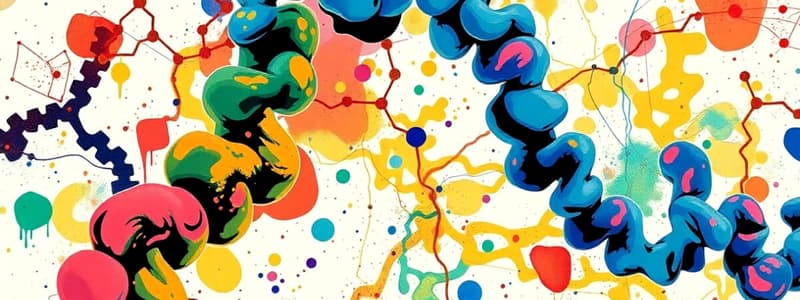Podcast
Questions and Answers
What type of bond links amino acids together in proteins?
What type of bond links amino acids together in proteins?
- Peptide bond (correct)
- Hydrogen bond
- Ionic bond
- Disulfide bridge
Proteins serve only a single function in the body.
Proteins serve only a single function in the body.
False (B)
What are the monomers that make up proteins?
What are the monomers that make up proteins?
Amino acids
Proteins can be either __________ or __________ in structure.
Proteins can be either __________ or __________ in structure.
Match the following terms related to proteins with their definitions:
Match the following terms related to proteins with their definitions:
Which of the following is NOT a function of proteins?
Which of the following is NOT a function of proteins?
The body is predicted to have hundreds of different types of proteins.
The body is predicted to have hundreds of different types of proteins.
What type of reaction forms a peptide bond between amino acids?
What type of reaction forms a peptide bond between amino acids?
Flashcards
Protein monomer
Protein monomer
Amino acid
Protein bond
Protein bond
Peptide bond
Protein structure Levels
Protein structure Levels
Primary, secondary, tertiary, and quaternary structures, defining the protein's 3D shape.
Protein function types
Protein function types
Signup and view all the flashcards
Fibrous protein
Fibrous protein
Signup and view all the flashcards
Globular protein
Globular protein
Signup and view all the flashcards
Protein folding cause
Protein folding cause
Signup and view all the flashcards
Protein misfolding outcome
Protein misfolding outcome
Signup and view all the flashcards
Study Notes
Proteins
- Proteins are made of amino acids linked together by peptide bonds to form one or more polypeptides
- Each polypeptide is folded and coiled into a unique conformation
- Proteins serve a wide variety of biological functions: catalysts (enzymes), transport, structural support, movement, messaging and signaling, defense against infection
- There are predicted to be tens of thousands of different types of proteins
- There are 20 different amino acids
Amino Acids
- The monomer of proteins is the amino acid
- Each amino acid has a central carbon backbone that has an amino group, a carboxyl group, and an R group
- The R group is variable and determines the amino acid’s properties
Polypeptides
- A polypeptide is a polymer of amino acids linked by peptide bonds
- Peptide bonds are formed via a condensation reaction
- Polypeptides have a C-terminus (carboxyl end) and an N-terminus (amino end)
Protein Structure
- Four main structural levels of proteins:
- Primary structure: the linear sequence of amino acids in a polypeptide chain
- Secondary structure: regular, repeating patterns of folding of the polypeptide chain, such as alpha-helices and beta-sheets
- Tertiary structure: the three-dimensional shape of a single polypeptide chain, including interactions such as hydrogen bonds, hydrophobic interactions, ionic bonds, and disulfide bridges
- Quaternary structure: the arrangement of multiple polypeptide chains (subunits) in a protein complex
- Proteins can be fibrous (elongated and fibrous) or globular (compact and spherical)
- Fibrous proteins often serve structural roles in the body
- Ex. keratin in hair and nails, collagen in tendons and ligaments
- Globular proteins are often involved in enzymatic activity, transport, signaling, and other biological functions
- Ex. antibodies, enzymes
- Fibrous proteins often serve structural roles in the body
Protein Folding
- The final shape of a protein is determined by its amino acid sequence and interactions between R groups
- Forces that stabilize secondary, tertiary, and quaternary structures:
- Hydrogen bonding between backbone atoms
- Hydrophobic interactions between nonpolar R groups
- Ionic interactions between charged R groups
- Disulfide bridges between cysteine residues
- Misfolding of proteins can lead to disease
- Prion diseases, Alzheimer's disease, and Parkinson's disease
Studying That Suits You
Use AI to generate personalized quizzes and flashcards to suit your learning preferences.



